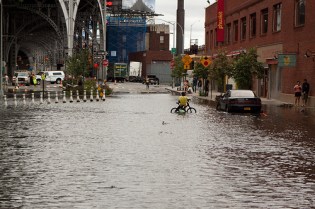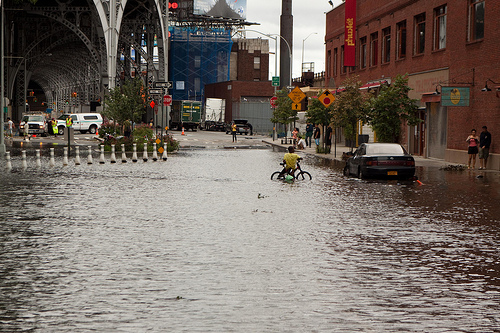
New York insurance companies are preparing for increased risk of flooding in the future. (Photo by Dave Bledsoe.)
Cross-posted from ThinkProgress Green.
Following the most damaging year of climate disasters in the United States in history, the insurance regulators in three states — California, Washington, and New York — announced that all major insurance companies operating in their states will be required to assess and publicly disclose the climate change-related risks they face, both in their underwriting as well as in their investment activities. Because of the consolidation of the insurance industry, this state-level action is effectively a national policy, as it affects 90 percent of the entire U.S. insurance market. Benjamin M. Lawsky, superintendent of New York’s Department of Financial Services, whose portfolio includes insurers, said in a statement that global warming pollution presents “unique risks” for the insurance industry to address:
Global warming presents unique risks, and it is vital that our insurance industry adequately account for the impacts of climate change. We look forward to working with the industry to address these important and growing risks.
Climate scientists have predicted broad-scale increases in extreme weather due to greenhouse pollution — particularly sea-level rise, heat waves, drought, and extreme precipitation — for decades. The science that is of utmost important for the insurance industry to embrace is that these long-term trends are accelerating with the exponential increase in fossil fuel burning. Insurance models based on the assumption of a stable climate, using historical averages, are dangerously wrong.
Now, climatologists are starting to be able to quantify the influence of greenhouse pollution on specific events. In 2006, Kevin Trenberth estimated the global warming influence on the deadly 2005 hurricane season [PDF]. Climate scientists broadly agree that the 2011 Texas drought shows a clear global warming signal [PDF], though different methodologies deliver different estimates. In future years, as disasters rise, climatologists will be able to better explain how changing the chemistry of our atmosphere and oceans with the burning of coal and oil is poisoning our weather.
The other unavoidable fact of human-made climate change is that no one can truly prepare for what will happen. Climate scientists know that global warming is influencing the jet stream, El Niño cycles [PDF], and other mesoscale weather phenomena, but cannot predict how that influence will manifest in future decades. Hurricane intensity is expected to increase but future storm tracks and frequency are largely unknown. Even without a global warming influence, tornadoes and high-wind events are unpredictable. And the cumulative impacts of accelerating damage to transportation, agricultural, electrical, and other infrastructure are impossible to insure against.



